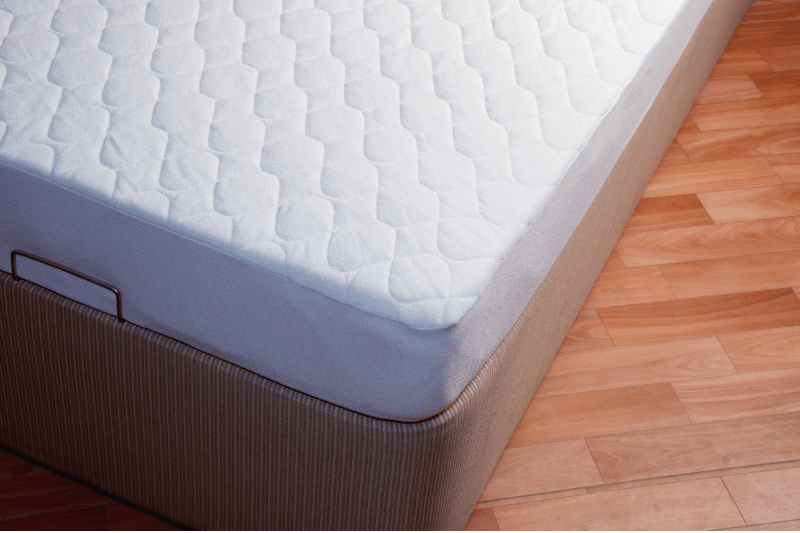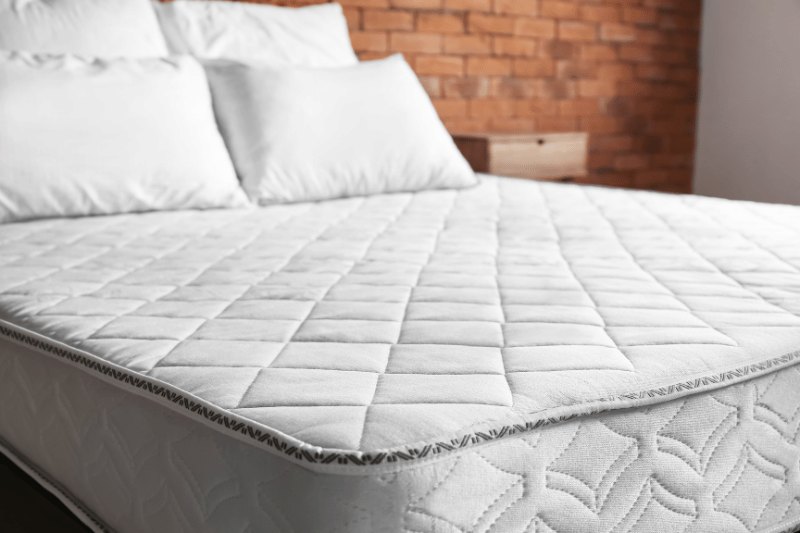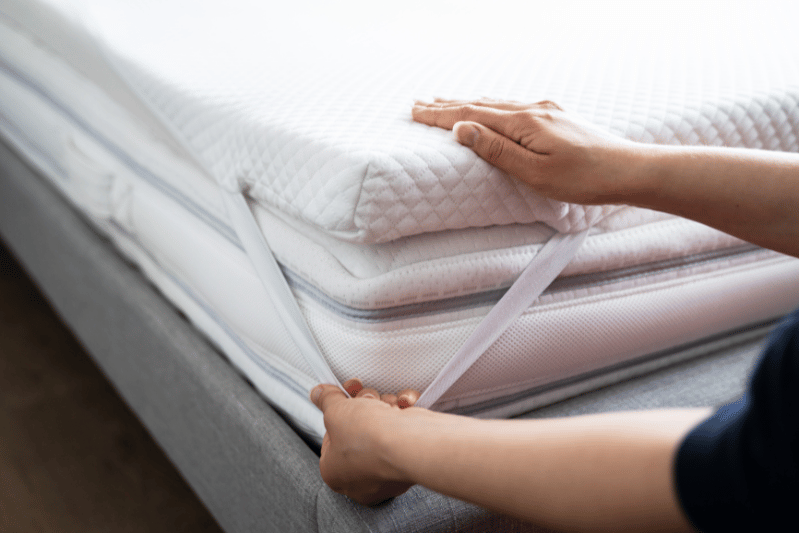Are you in the market for a new bed but feeling overwhelmed by the price tags? You're not alone. Mattresses can range from a few hundred dollars to the price of a small car. It's tricky figuring out how much to spend, but don't worry, I've got your back!
On average, people spend around $1,000 on a mattress, but prices can swing widely based on a number of factors. The key is to find the sweet spot where cost meets quality. Remember, a good mattress isn't just a purchase; it's an investment in your health and sleep quality.
Sometimes, paying a bit more can get you a mattress that stands the test of time and gives you the restful sleep you deserve.
Let me walk you through this maze. We'll look at different types of mattresses and their costs, weigh up what you really need for a good night's sleep, and help you set a budget that fits your wallet. Think of it as a journey to find your dream bed without breaking the bank.
Key Takeaways
- Price Categories Matter: Your choice should depend on your needs and budget, with higher prices typically offering better quality and longevity, especially for organic materials.
- Timing is Key for Savings: The best times to purchase a mattress are during holiday sales and between March and May.
- Smart Shopping Strategies: Compare prices online and in-store, don’t hesitate to negotiate in physical stores, and avoid spending on unnecessary extras.
How Much Does an Organic Mattress Cost?
You'll likely find prices ranging from $500 to $3,000. The cost varies based on size, materials used, and how the mattress is made. If you're aiming for something economical yet comfortable, prepare to spend around $1000 — this is the sweet spot for a mattress budget.
The amount you should spend on a mattress depends largely on your personal needs, health considerations, and budget. If organic materials and eco-friendliness are high priorities for you, aiming for the higher end of the average range or dipping into the luxury category can be worthwhile. Remember, a good mattress is an investment in your health and well-being.
Moreover, consider the longevity of the mattress. A higher initial investment might seem steep, but if the mattress lasts longer and provides better sleep, it could be more cost-effective in the long run. For those who have specific health concerns or sleep issues, investing in a higher-quality mattress could also mean fewer expenses on health care related to poor sleep or back problems.
While budget constraints are real and important to consider, spending a bit more within the average to luxury range, especially for organic mattresses, often means a better balance of quality, comfort, and ethical manufacturing.
Budget Mattress Cost: Affordable But Not the Best Option

Looking for a budget-friendly mattress? Prices for these can range from about $500 to $1,000, depending on the size you need – from a cozy twin to a spacious California king.
Now, you might spot cheaper options, but they often don't last very long. It's like buying a cheap umbrella that breaks in the first storm. If you're tight on budget, it's okay to go for the lower end, but for a bit of lasting quality, aim to start at around $500.
And here's a tip: Shop during major sales to snag some serious discounts.
Budget mattresses typically fall into two categories: innerspring and all-foam. Even at lower prices, you can find decent quality if you know where to look. Start by searching online for the best affordable mattresses – there are some real treasures out there.
Foam mattresses are quite popular online, especially in the budget end. They're great for reducing pressure points and absorbing movement. So, if your partner tosses and turns, you won't feel a thing.
If you're hunting for a real deal, consider an innerspring mattress. These have a coil system and are fairly bouncy. They don't absorb movement much, so you might feel your partner's movements more. It's a bit like sleeping on a traditional bed – some bounce, but not much cushioning against movement.
The good thing is there are some organic latex options available in this category. The Latex for Less is a good example of an affordable latex option.
Whether you go for foam, innerspring, or organic latex, budget mattresses have quality options. It's all about finding the right fit for your sleep needs and your wallet.
Mid-Range Mattress Cost: Bang For The Buck!

Looking for a comfortable mattress without breaking the bank? Mid-range mattresses, typically priced between $1000 and $2000, could be your sweet spot.
These mattresses often use better materials and come in all-foam or hybrid styles. Think of them as the reliable sedan of mattresses – not a luxury sports car, but definitely more comfortable and durable than a budget model. They last longer, meaning you won't have to replace your mattress as often. Plus, in this price range, you'll start seeing more natural and organic mattress options.
In the world of mid-range mattresses, there's a whole sea of choices.
For example, the Eco Terra - Hybrid Latex Mattress and the Naturepedic Chorus Organic Mattress stand out. These aren't your average foam mattresses; they're often cooler and more supportive, thanks to high-quality foam.
So, if you want a mattress that offers a mix of quality, comfort, and durability, mid-range is the way to go. You'll sleep better knowing you've found a great mattress that won’t need a replacement anytime soon.
Luxury Mattress Costs: The Best Sleep You Can Have

Ready to indulge in a bit of luxury in your sleep? Luxury mattresses, with prices starting around $2,000 and soaring up to $3,000 or more, are where comfort meets elegance. Especially, if you're eyeing the biggest and tallest options out there.
These beds aren't just about luxury; they're built to last. Think of them like a high-end car with a long-term warranty – some even offer up to 25 years of coverage! Most luxury mattresses are either hybrids or made from premium materials like latex, making them a solid investment if they're within your budget.
Latex mattresses, known for their springiness and durability, come in synthetic or natural forms. If you're someone who cares about the environment or has allergies, natural latex is a dream come true.
It's sustainable, hypoallergenic, and even keeps you cool if you're a hot sleeper. The price can vary, though. Dunlop latex is generally more affordable because it's easier to produce, while Talalay latex, known for being more breathable and luxurious, tends to be pricier.
For those looking at the more affordable end of luxury, the Naturepedic EOS Mattress is a great choice with its natural Dunlop latex. But if you're willing to splurge, check out something like the PlushBeds Botanical Bliss, which layers multiple levels of Talalay latex for that extra touch of opulence.
So, if your budget allows, stepping into the world of luxury mattresses opens the door to unparalleled comfort and quality. It's a choice that not only enhances your sleep experience but also promises longevity and health benefits.
Shopping Hacks for Your Next Mattress Purchase

Looking for a new mattress without overspending? Here's how to snag a great deal:
Shop During Holiday Sales
Mattresses often get big discounts on holidays like Presidents' Day, Memorial Day, Labor Day, 4th of July, Veteran's Day, Columbus Day, New Year's Day, Cyber Monday, and Black Friday. The best months to buy? March, April, and May. This is when new models arrive, and old ones get hefty price cuts to clear out inventory.
Compare, Compare, Compare
Take a quick look online and visit a few stores to compare prices on the mattresses you like. A little bit of research can reveal which store offers the best deal on your preferred brand or model.
Negotiate for a Better Deal
Especially in physical stores, don't hesitate to haggle. If you know the mattress has been on sale before, tell the salesperson your price limit and stick to it. If the deal doesn't feel right, it's okay to walk away. Remember, there's always another sale around the corner.
Skip Unnecessary Extras
Avoid getting talked into buying box springs, toppers, or other accessories you don't need. Do your research beforehand to know exactly what's necessary for your new mattress. This approach can save you from unnecessary expenses.
By following these tips, you can find a great mattress that suits both your comfort and your budget, without getting caught in common spending traps.
Happy mattress hunting!
Final Thoughts
Choosing the perfect mattress involves balancing quality, comfort, and budget. We've explored various options across different price ranges – budget ($500 to $1,000), average ($1,500 to $2,000), and luxury ($2,000 to over $3,000) – each offering different features and benefits. Whether you need a temporary solution or a long-term investment in organic, eco-friendly luxury, there's a mattress out there for you.
To make the most of your budget, remember these key tips:
- Holidays and the months of March through May are prime times for discounts as stores clear out old inventory.
- A little research online and in-store can lead to significant savings, helping you find the best deal for your preferred mattress.
- Don't shy away from haggling in physical stores, especially if you're aware of past sales prices.
- Be discerning about accessories like box springs and toppers unless they're essential for your sleep comfort.
In the end, the right mattress is one that meets your specific sleep needs, aligns with your environmental values, and fits within your budget. By applying these strategies, you can rest easy knowing you've made a smart, informed decision that will benefit your sleep—and your wallet—for years to come.
Frequently Asked Questions
How much does the average person spend on a mattress?
The average person spends between $1,000 to $2,000 on a mattress. It's important to consider budget and personal preferences when making this important investment.
What is a reasonable price for a good quality mattress?
For a good quality mattress, a baseline budget of $500 is reasonable. However, it's advisable to budget for more if you need additional items like sheets or a bed frame to ensure a comfortable sleep experience.
Should you spend a lot of money on a mattress?
It's recommended to spend between $500 and $1,000 on a decent mattress, especially if you don't have musculoskeletal or back issues. Spending less than $1,000 for an innerspring or all foam mattress might compromise on quality, so it's worth investing a bit more.
What factors affect the price of a mattress?
The price of a mattress is influenced by factors such as materials, construction, brand reputation, warranty, and trial period. Keep these factors in mind when considering a purchase.
How can I save money when buying a mattress?
You can save money when buying a mattress by researching, comparing prices, negotiating, timing your purchase, and considering older models or online deals. These strategies can help you find a great mattress at a lower cost.
Green Blog
How Much Should You Spend on a Mattress for Optimal Sleep?
Written by : Samira Tasneem | Last Updated: January 15, 2024
Contents
Are you in the market for a new bed but feeling overwhelmed by the price tags? You’re not alone. Mattresses can range from a few hundred dollars to the price of a small car. It’s tricky figuring out …
Are you in the market for a new bed but feeling overwhelmed by the price tags? You're not alone. Mattresses can range from a few hundred dollars to the price of a small car. It's tricky figuring out how much to spend, but don't worry, I've got your back!
On average, people spend around $1,000 on a mattress, but prices can swing widely based on a number of factors. The key is to find the sweet spot where cost meets quality. Remember, a good mattress isn't just a purchase; it's an investment in your health and sleep quality.
Sometimes, paying a bit more can get you a mattress that stands the test of time and gives you the restful sleep you deserve.
Let me walk you through this maze. We'll look at different types of mattresses and their costs, weigh up what you really need for a good night's sleep, and help you set a budget that fits your wallet. Think of it as a journey to find your dream bed without breaking the bank.
Key Takeaways
How Much Does an Organic Mattress Cost?
You'll likely find prices ranging from $500 to $3,000. The cost varies based on size, materials used, and how the mattress is made. If you're aiming for something economical yet comfortable, prepare to spend around $1000 — this is the sweet spot for a mattress budget.
The amount you should spend on a mattress depends largely on your personal needs, health considerations, and budget. If organic materials and eco-friendliness are high priorities for you, aiming for the higher end of the average range or dipping into the luxury category can be worthwhile. Remember, a good mattress is an investment in your health and well-being.
Moreover, consider the longevity of the mattress. A higher initial investment might seem steep, but if the mattress lasts longer and provides better sleep, it could be more cost-effective in the long run. For those who have specific health concerns or sleep issues, investing in a higher-quality mattress could also mean fewer expenses on health care related to poor sleep or back problems.
While budget constraints are real and important to consider, spending a bit more within the average to luxury range, especially for organic mattresses, often means a better balance of quality, comfort, and ethical manufacturing.
Read More:
The Ultimate Guide to Choosing an Organic Mattress
Budget Mattress Cost: Affordable But Not the Best Option
Looking for a budget-friendly mattress? Prices for these can range from about $500 to $1,000, depending on the size you need – from a cozy twin to a spacious California king.
Now, you might spot cheaper options, but they often don't last very long. It's like buying a cheap umbrella that breaks in the first storm. If you're tight on budget, it's okay to go for the lower end, but for a bit of lasting quality, aim to start at around $500.
And here's a tip: Shop during major sales to snag some serious discounts.
Budget mattresses typically fall into two categories: innerspring and all-foam. Even at lower prices, you can find decent quality if you know where to look. Start by searching online for the best affordable mattresses – there are some real treasures out there.
Foam mattresses are quite popular online, especially in the budget end. They're great for reducing pressure points and absorbing movement. So, if your partner tosses and turns, you won't feel a thing.
If you're hunting for a real deal, consider an innerspring mattress. These have a coil system and are fairly bouncy. They don't absorb movement much, so you might feel your partner's movements more. It's a bit like sleeping on a traditional bed – some bounce, but not much cushioning against movement.
The good thing is there are some organic latex options available in this category. The Latex for Less is a good example of an affordable latex option.
Whether you go for foam, innerspring, or organic latex, budget mattresses have quality options. It's all about finding the right fit for your sleep needs and your wallet.
Read More:
10 Best Organic Mattresses: Reviews and Buyers’ Guide
Mid-Range Mattress Cost: Bang For The Buck!
Looking for a comfortable mattress without breaking the bank? Mid-range mattresses, typically priced between $1000 and $2000, could be your sweet spot.
These mattresses often use better materials and come in all-foam or hybrid styles. Think of them as the reliable sedan of mattresses – not a luxury sports car, but definitely more comfortable and durable than a budget model. They last longer, meaning you won't have to replace your mattress as often. Plus, in this price range, you'll start seeing more natural and organic mattress options.
In the world of mid-range mattresses, there's a whole sea of choices.
For example, the Eco Terra - Hybrid Latex Mattress and the Naturepedic Chorus Organic Mattress stand out. These aren't your average foam mattresses; they're often cooler and more supportive, thanks to high-quality foam.
So, if you want a mattress that offers a mix of quality, comfort, and durability, mid-range is the way to go. You'll sleep better knowing you've found a great mattress that won’t need a replacement anytime soon.
Read More:
Naturepedic Chorus Organic Mattress Review
Luxury Mattress Costs: The Best Sleep You Can Have
Ready to indulge in a bit of luxury in your sleep? Luxury mattresses, with prices starting around $2,000 and soaring up to $3,000 or more, are where comfort meets elegance. Especially, if you're eyeing the biggest and tallest options out there.
These beds aren't just about luxury; they're built to last. Think of them like a high-end car with a long-term warranty – some even offer up to 25 years of coverage! Most luxury mattresses are either hybrids or made from premium materials like latex, making them a solid investment if they're within your budget.
Latex mattresses, known for their springiness and durability, come in synthetic or natural forms. If you're someone who cares about the environment or has allergies, natural latex is a dream come true.
It's sustainable, hypoallergenic, and even keeps you cool if you're a hot sleeper. The price can vary, though. Dunlop latex is generally more affordable because it's easier to produce, while Talalay latex, known for being more breathable and luxurious, tends to be pricier.
For those looking at the more affordable end of luxury, the Naturepedic EOS Mattress is a great choice with its natural Dunlop latex. But if you're willing to splurge, check out something like the PlushBeds Botanical Bliss, which layers multiple levels of Talalay latex for that extra touch of opulence.
So, if your budget allows, stepping into the world of luxury mattresses opens the door to unparalleled comfort and quality. It's a choice that not only enhances your sleep experience but also promises longevity and health benefits.
Read More:
PlushBeds Botanical Bliss Mattress Review
Shopping Hacks for Your Next Mattress Purchase
Looking for a new mattress without overspending? Here's how to snag a great deal:
Shop During Holiday Sales
Mattresses often get big discounts on holidays like Presidents' Day, Memorial Day, Labor Day, 4th of July, Veteran's Day, Columbus Day, New Year's Day, Cyber Monday, and Black Friday. The best months to buy? March, April, and May. This is when new models arrive, and old ones get hefty price cuts to clear out inventory.
Compare, Compare, Compare
Take a quick look online and visit a few stores to compare prices on the mattresses you like. A little bit of research can reveal which store offers the best deal on your preferred brand or model.
Negotiate for a Better Deal
Especially in physical stores, don't hesitate to haggle. If you know the mattress has been on sale before, tell the salesperson your price limit and stick to it. If the deal doesn't feel right, it's okay to walk away. Remember, there's always another sale around the corner.
Skip Unnecessary Extras
Avoid getting talked into buying box springs, toppers, or other accessories you don't need. Do your research beforehand to know exactly what's necessary for your new mattress. This approach can save you from unnecessary expenses.
By following these tips, you can find a great mattress that suits both your comfort and your budget, without getting caught in common spending traps.
Happy mattress hunting!
Final Thoughts
Choosing the perfect mattress involves balancing quality, comfort, and budget. We've explored various options across different price ranges – budget ($500 to $1,000), average ($1,500 to $2,000), and luxury ($2,000 to over $3,000) – each offering different features and benefits. Whether you need a temporary solution or a long-term investment in organic, eco-friendly luxury, there's a mattress out there for you.
To make the most of your budget, remember these key tips:
In the end, the right mattress is one that meets your specific sleep needs, aligns with your environmental values, and fits within your budget. By applying these strategies, you can rest easy knowing you've made a smart, informed decision that will benefit your sleep—and your wallet—for years to come.
Frequently Asked Questions
How much does the average person spend on a mattress?
The average person spends between $1,000 to $2,000 on a mattress. It's important to consider budget and personal preferences when making this important investment.
What is a reasonable price for a good quality mattress?
For a good quality mattress, a baseline budget of $500 is reasonable. However, it's advisable to budget for more if you need additional items like sheets or a bed frame to ensure a comfortable sleep experience.
Should you spend a lot of money on a mattress?
It's recommended to spend between $500 and $1,000 on a decent mattress, especially if you don't have musculoskeletal or back issues. Spending less than $1,000 for an innerspring or all foam mattress might compromise on quality, so it's worth investing a bit more.
What factors affect the price of a mattress?
The price of a mattress is influenced by factors such as materials, construction, brand reputation, warranty, and trial period. Keep these factors in mind when considering a purchase.
How can I save money when buying a mattress?
You can save money when buying a mattress by researching, comparing prices, negotiating, timing your purchase, and considering older models or online deals. These strategies can help you find a great mattress at a lower cost.
Samira Tasneem
Samira is an Electronics and Communications Engineer by profession, but deep inside, her heart is a nomad! She's a state champion debater, a public speaker, a scriptwriter, a theater actress, but most importantly — A GREEN CITIZEN! She thinks of herself as a storyteller who thrives on enjoying the life at fullest and telling everyone the tales of life.
Quick Links
Green Living Guides
Green Jobs
Inspiring Green News
Green Directory
Green Store
Electronics Recycling
Category: Green Blog, Lifestyle, Sustainable Living